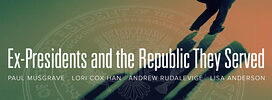I too appreciate the chance to both think about these issues and to engage with those who have far better thoughts! In a post-pandemic time I hope the conversation will continue over some age-appropriate beverages. Discussions of the Ford pardon of Richard Nixon, a text presumably under renewed study in the Trump White House for its preemptive magic, almost demand appropriate liquid refreshment (Billy Beer, anyone? Cutty Sark and soda, in a Styrofoam cup?) For now I’d just reframe the old line about Nixon – just because you’re paranoid doesn’t mean they’re not out to get you – by noting that just because the wisdom is conventional doesn’t mean it’s wrong.
Along the lines of strengthening the Presidential Records Act (PRA), I wanted to pass along a relevant recent episode of NPR’s “1A” featuring the National Security Archive’s Tom Blanton. Blanton notes the problem of allowing presidents to serve as judges in their own case when it comes to enforcing the PRA to preserve records. He suggests the National Archives be given the power to “prowl about” the White House, conducting audits of how assiduously sitting presidents are following the PRA’s mandates, as well as giving outside groups clearer standing in bringing court challenges against PRA violations.
I’m not sure I agree that urging earlier and enhanced access to government records is a case of “special pleading” for professional scholars. My work and others’ would surely benefit from unearthing additional documents. And archival work is simultaneously an invaluable and undervalued mode of research in political science. (Far easier to “scrape” the Public Papers of the Presidents than to head to Independence, MO, to read the seventeen drafts that came before the version uttered. But if you don’t go to Independence, you don’t get a Big Biscuit.)
That said, the point is not to serve the members of APSA’s Presidents and Executive Politics section – or even the thousands of journalists, students, and armchair historians who also frequent the National Archives and presidential library system. Rather, it is to establish standards for transparency that enforce accountability. In 1885, Woodrow Wilson wrote of the “informing function of Congress” and the need for that body to “have and use every means of acquainting itself with the act and the disposition of the administrative agents of the government.” If it did not, “the country must…remain in embarrassing, crippling ignorance of the very affairs which it is most important that it should understand and direct.”
The fundamental aim, after all, was not legislative “gotcha” moments but the empowerment of the people – since “the only really self-governing people is that people which discusses and interrogates its administration.” More open access to federal records through a well-funded and impartially run archival system could help us do just that.
Paul Musgrave is correct that my proposals for a free market in “fame” (in the Hamiltonian, even Machiavellian sense) are both more optimistic and more expensive than his more formal institutions. It’s true that I am rather more hopeful than others about the power of posterity to compel present behavior. The good news is that we are talking about a targeted audience here, a (small) population for whom public approbation has long-guided their life decisions – as Richard Ben Cramer’s 1051 pages of collective case study of just the 1988 crop of presidential aspirants helped document. Even the current incumbent’s refusal to let electoral reality overcome fictional fraudulence is presumably grounded in his desire to maintain his public (and thus self-) image. But in the end I can hardly deny there may be need to guide the invisible hand.
Apropos of Cramer, I was glad to see that my thoughts on giving thought to the front end of the process as well as the aftermath were echoed in Lisa Anderson’s post as well. After all, the presidents we pick will become the ex-presidents we endure. I like the idea of the “preemptory dignity check” she suggests – I suspect it can only be administered by newly empowered political parties that benefit from dignity rather than simply from discord. Achieving that might well be the topic of another long conversation.

